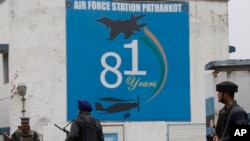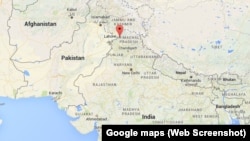A team of Pakistani investigators is in India to probe a deadly terror attack on an Indian airbase earlier this year that New Delhi has blamed on Pakistan-based militants. The assault, in which seven Indian soldiers died, set back efforts to resume talks between the rivals, but the joint probe is being seen as a sign of cooperation.
Indian investigators briefed five Pakistani officials Monday in New Delhi about key evidence collected so far about the January 2 attack in which six gunmen stormed the strategic defense facility at Pathankot, about 50 kilometers from the border with Pakistan.
New Delhi says evidence it has gathered points to the involvement of the banned Islamist group Jaish-e-Mohammad.
This is the first time Pakistani intelligence officials are in India to investigate a militant strike on Indian soil.
On Tuesday, the investigators, who include officials from Pakistan’s military intelligence and police, will get limited access to the Pathankot air base. Amid some controversy over the officials gaining entry to an Indian military installation, Indian Defense Minister Manohar Parrikar said he has instructed “that the crime scene should be barricaded, visually blocked or obstructed and external entry should be given.”
The Pakistani investigators will question witnesses, but New Delhi has declined them permission to talk to security personnel.
Pakistan offered to send the team after India shared information, including telephone numbers of the “handlers” who were directing the gunmen.
Huge step
Rana Banerji, a former top official at India's external intelligence arm - the Research and Analysis Wing - said the probe represents a huge step forward in counterterrorism efforts.
“We should try and make this particular effort by Pakistan and a collective attempt by both countries a success. We should make all efforts to provide the necessary information the Pakistani investigators would seek,” he said.
Pakistan’s initiative to send a special team and its detention of several members of the Jaish-e-Mohammad group in the days after the attack was seen as an effort to not let the attack derail ties.
Banerji, a specialist on Pakistan and militant groups, points out the larger question is how both countries should cooperate in counterterrorism.
“Both sides now should realize that there is no gain from continuing confrontation on these issues, posing hurdles and obstacles,” he said.
The visit of the Pakistani team comes days before a likely meeting between Indian Prime Minister Narendra Modi and his Pakistani counterpart Nawaz Sharif on the sidelines of the fourth Nuclear Security Summit in Washington. An unexpected stop by Modi in Lahore in December had led to a thaw in ties, but the initiative was set back by the Pathankot attack, which came just 10 days later.





